William Meikle's Blog: Latest, page 66
December 2, 2015
A Writer’s Mantra
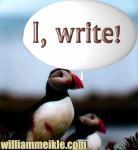 Some of you will have read this before elsewhere, but I think it bears repeating.
Some of you will have read this before elsewhere, but I think it bears repeating.
It is a mantra, after all.
The conversation usually goes the same way.
“What do you do?” they say.
“I’m a writer,” I answer.
“I always wanted to do that,” they say.
I wonder if brain surgeons or rocket scientists get the same response?
After I’ve stifled the urge to scream, I ask why they’ve never done anything about writing.
“Oh, I’m too busy.”
And there’s the rub. Everybody is always too busy. But writing doesn’t get done if you don’t do it. It is purely a matter of whether you’ve got the will and the commitment to get the words down, see your name in print, get the fortune and glory, the Hollywood deal, the yacht in the Bahamas and as much caviare as you can snort – all that happy crap that will never happen if you don’t sit on your arse and write.
So here is your mantra. Chant it at all times, and repeat it to boring types at dinner parties.
Writers Write! Wannabe Writers Wanna Write.
As with all good mantras, it bears closer study. What it says, in a nutshell, is that you’ll never be a writer if you don’t write. Obvious really, but most beginners ignore it. They procrastinate, they obfuscate, and they pretend to the world and his wife that they’re “Working on a piece right now.”
Don’t believe them. What they mean is that they’ve had an idea, but they don’t really want to do the work to put it in writing. The only way to do it is to sit down with your means of expression, be it pen, word processor, or big thick crayon, and write. Keep writing, and don’t stop until you’re happy with what you’ve produced.
Now. Repeat after me.
Writers Write! Wannabe Writers Wanna Write.
Now, if you want to call yourself a writer, go and do something about it. It doesn’t matter what you write as long as you start. Your brain gets used to the idea, and soon writing becomes second nature.
Remember the mantra, and it will serve you well.
Writers Write! Wannabe Writers Wanna Write.
It’s probably the single most important thing that you can learn about the process in my opinion.








December 1, 2015
Thoughts on being called prolific
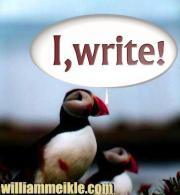
Aye, right
I’m aware I have a bit of a reputation for writing a lot.
I’m not sure I do, really – I average about 1200 words a day. Over the course of a year it works out to a lot of words, and a lot of stories, novellas and novels. I also end up throwing a fair bit aside in editing. For example, this year it adds up to 2 novels, 2 novellas and 24 short stories. For a full time writer, which is what I am these days, it certainly doesn’t feel like I’m pushing it – I could do more. A lot more. Other writers certainly do, and I know folks who average twice what I manage, and do it easily.
What I am good at, to a degree, is finding appropriate markets. It’s something I honed back in the small press days before the internet, when a lot of time was spent just seeking out venues to send stuff to, and some of the habits I developed then have stuck with me in that I monitor subs in a spreadsheet, and track who responds, who doesn’t, and who asks for more.
These days I tend to only submit short stories to higher paying venues, a tactic that has been paying off for me for a few years now, and to markets I’ve already had a foothold in. It also helps a lot to have long term contracts with several of the genre publishers like Dark Regions Press, Dark Renaissance and, in particular DarkFuse, so that I’ve had open avenues for publication for the longer pieces for a couple of years now too.
So all of that adds up to the fact that I’ve got a fairly high visibility now in several genres for a variety of publishers, and I think that works in my favor when something of mine lands in front of a new editor.
It also means that I’ve been getting stuff published in a lot of different venues, at regular intervals, so I suppose that’s why it appears to onlookers that I’m really prolific.
In reality, I’m over here wondering whether I’m doing enough, fretting that I don’t get noticed as much as I’d like, fearing that I’m slacking, and feeling the cold grip of Father Time on my neck as I head toward my seventh decade in a couple of years time.
I have roads to travel yet, stories to tell, and stopping doesn’t appear to be an option, so if I am prolific, you’re stuck with me for a few more years yet.





 [image error]
[image error]

November 29, 2015
Sherlock Holmes and Me
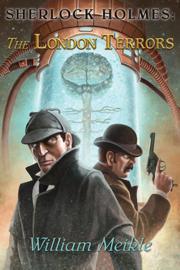 Nowadays there is a plethora of detectives in both book and film who may seem to use the trappings of crime solvers, but get involved in the supernatural. William Hjortsberg’s Falling Angel (the book that led to the movie Angel Heart) is a fine example, an expert blending of gumshoe and deviltry that is one of my favorite books. Likewise, in the movies, we have cops facing a demon in Denzel Washington’s Fallen that plays like a police procedural taken to a very dark place.
Nowadays there is a plethora of detectives in both book and film who may seem to use the trappings of crime solvers, but get involved in the supernatural. William Hjortsberg’s Falling Angel (the book that led to the movie Angel Heart) is a fine example, an expert blending of gumshoe and deviltry that is one of my favorite books. Likewise, in the movies, we have cops facing a demon in Denzel Washington’s Fallen that plays like a police procedural taken to a very dark place.
My interest goes further back to the “gentleman detective” era where we have seekers of truth in Blackwood’s John Silence, Sherlock Holmes and William Hope Hodgson’s Carnacki.
I was raised on Doyle, Wells and Robert Louis Stevenson and I love that historical period they covered in their work. It’s also the time period I’ve come to prefer for my own writing and I can see me settling in there for a long time to come.
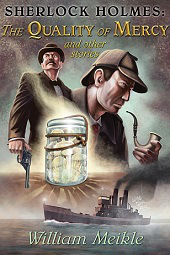 It is the character first and foremost that draws me to Holmes. Doyle brought him to life. He is instantly recognizable all over the world and has been for over 100 years. Few other writers have managed that trick.
It is the character first and foremost that draws me to Holmes. Doyle brought him to life. He is instantly recognizable all over the world and has been for over 100 years. Few other writers have managed that trick.
I’ve written a number of weird Sherlock Holmes stories over the past few years. The first one was THE QUALITY OF MERCY in Gaslight Grotesque for EDGE Publishing.
Since then I’ve done THE CALL OF THE DANCE, published in the Lovecraft ezine, THE COLOUR THAT CAME TO CHISWICK in Gaslight Arcanum and a novella from Dark Regions, SHERLOCK HOLMES: REVENANT, published by them in ebook and paperback.
The above are all also included in the hardcover and trade paperback collection from Dark Renaissance, SHERLOCK HOLMES: THE QUALITY OF MERCY AND OTHER STORIES.
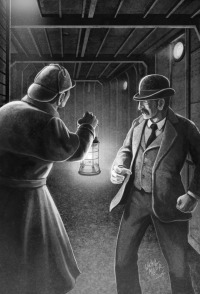
Wayne Miller illo for THE LONG SLEEP in THE LONDON TERRORS
I have three more Holmes novellas available from Dark Renaissance. THE HACKNEY HORROR, THE LOST HUSBAND and THE LONG SLEEP are in a collated edition, THE LONDON TERRORS, a companion volume to THE QUALITY OF MERCY.
There is also a new short novel, THE DREAMING MAN, due in hardcover and paperback in 2016.
While I’m at it, I must give credit to the great Wayne Miller, whose illustrations, both for the covers and for the interior B&W work are never short of stellar. They make these Dark Renaissance editions into works of art in their own right and I love them muchly.
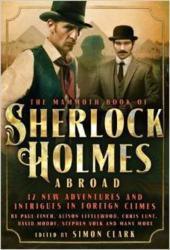 There was also a new short story this year, THE CASE OF THE MALTESE CATACOMBS in THE MAMMOTH BOOK OF SHERLOCK HOLMES ABROAD, edited by Simon Clark where I got to share page space with some of my writing heroes.
There was also a new short story this year, THE CASE OF THE MALTESE CATACOMBS in THE MAMMOTH BOOK OF SHERLOCK HOLMES ABROAD, edited by Simon Clark where I got to share page space with some of my writing heroes.
And I’m currently waiting to hear back on a submission to another anthology that’ll be good news if I make the cut.
I probably won’t stop until all the bad guys are caught.
See more at: http://www.williammeikle.com/Sherlockandme.html








November 27, 2015
Want to write a short story?
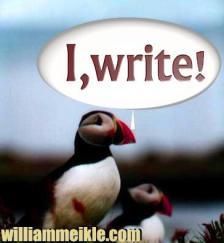 A wee while back I was a judge for a short story writing competition and the experience of reading scores of stories prompted some thinking on what I like in a short story, and how I think you should approach writing one. So, for what it’s worth, here’s some thoughts on the process from me.
A wee while back I was a judge for a short story writing competition and the experience of reading scores of stories prompted some thinking on what I like in a short story, and how I think you should approach writing one. So, for what it’s worth, here’s some thoughts on the process from me.
Writing a short story is a bit like telling a joke. The trick is to grab your audience’s attention, lead them through a situation, and garner a response from them when you’re done.
And like a joke, the best stories start just before the punchline is due. If you’re telling a “Horse walks into a bar” joke, you don’t start with a horse out in a field.
Start as close to the end as you can and only fill in as much back story as is required.
For example, you don’t need to tell how the horse came to be able to talk, how scientists the world over were baffled, how all that talking made him thirsty, and how he managed to get a pig on his back.
This is a story – you need to be able to get your audience to suspend their disbelief for as long as the story takes. Too much explanation and exposition and the audience gets bored quickly.
Similarly, you don’t need the input of the guy at the bar who knows the pig, has met him before and wants a chat about old times before the barman gets involved. Trim all extraneous voices and characters.
And do remember the climax / punchline. If your story ends with the horse asking for a beer, you haven’t finished yet.
In short, get in, get out, and leave them wanting more.
And please, please, please avoid constructs such as ‘She nodded her head and it fell off.’








A new Kindle short for Xmas
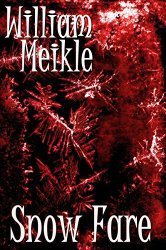 SNOW FARE is a new short story from me, available on Kindle for the first time.
SNOW FARE is a new short story from me, available on Kindle for the first time.
A bereaved woman and her daughter prepare for their first Xmas alone as a winter storm approaches. But are they quite alone as they seem?
Magic and mayhem are afoot in the night. A cold night, where survival is the only hope.








November 26, 2015
Verisimilitude in writing
 The word for today is verisimilitude.
The word for today is verisimilitude.
The way I write is similar to the way that Tim Roth learns his joke in Reservoir Dogs. Roth needs something that will convince the gang that he’s kosher… a slice of life that will indicate he knows the ropes, that he’s been around.
At first, when he tells the story, he sounds like your dad ruining his favorite dinner table joke for the hundredth time. “Oh wait… did I tell you the horse had a pig with him?”
But gradually he begins to understand the rhythm of the story, and how it depends on knowing all the little details, even the ones that no one ever sees or hears. He knows what color of trousers he was wearing the day the story took place, he knows that the police dog had a bad leg, he knows that the toilet block smelled of piss and shit. He has the sense of place so firmly in his mind that even he almost believes he’s been there.
Then, and only then can he tell the story.
And that’s how I work. I need to almost remember it as having happened. I need to see, hear, touch, taste and smell it. But more than that, I need to -feel- that it’s real, that somewhere in the Universe, this thing actually happened.
This form of total immersion in the story has its drawbacks. It leads to a certain level of divorce from reality, involving spending very large amounts of time living in your imagination. If you’re not careful, you find yourself talking to your characters in your head, holding conversations with them. Even worse, you may find one of them trying to dictate your actions in your day to day life. That’s an extreme case, straying into Stephen King territory, but I know from experience I’ve been close to that edge myself.
Saying that, it is a necessary part of the process, for me anyway. And I suspect its that way for other writers too.
Anyone else going to admit to being slightly crazy in this way?








November 25, 2015
Why I wrote THE EXILED
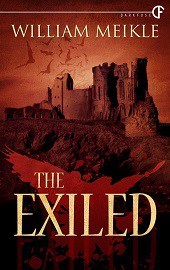
My novel THE EXILED is a fusion of several different life threads.
Firstly there’s Edinburgh.
A lot of my work, long and short form, has been set in Scotland, and much of it uses the history and folklore. There’s just something about the misty landscapes and old buildings that speaks straight to my soul. Bloody Celts… we get all sentimental at the least wee thing.
I grew up on the West Coast of Scotland in an environment where the supernatural was almost commonplace.
My grannie certainly had a touch of ‘the sight’, always knowing when someone in the family was in trouble. There are numerous stories told of family members meeting other, long dead, family in their dreams, and I myself have had more than a few encounters with dead family, plus meetings with what I can only class as residents of faerie. I have had several precognitive dreams, one of which saved me from a potentially fatal car crash.
I have a deep love of old places, in particular menhirs and stone circles, and I’ve spent quite a lot of time travelling the UK and Europe just to visit archaeological remains. I also love what is widely known as ‘weird shit’. I’ve spent far too much time surfing and reading Fortean, paranormal and cryptozoological websites. The cryptozoological stuff especially fascinates me, and provides a direct stimulus for a lot of my fiction.
I’ve also been influenced by many Scottish writers. Robert Louis Stevenson in particular is a big influence. He is a master of plotting, and of putting innocents into situations far out of their usual comfort zones while still maintaining a grounding in their previous, calmer, reality. His way with a loveable rogue in Treasure Island and Kidnapped in particular is also a big influence. Other Scottish writers who have influenced me include John Buchan, Iain Banks and, more in my youth than now, Alistair MacLean and Nigel Tranter. From them I learned how to use the scope of both the Scottish landscape and its history while still keeping the characters alive.
But I think it’s the people that influence me most. Everybody in Scotland’s got stories to tell, and once you get them going, you can’t stop them. I love chatting to people, usually in pubs, and finding out the weird shit they’ve experienced.
Which brings me back to Edinburgh. Those of us brought up in the West of Scotland have a love / hate relationship with our country’s capital. We can appreciate the castle, the architecture and the history, but the people have always felt slightly aloof, suffering from a superiority complex that our side of Scotland feels is unwarranted – ‘all fur coat and no knickers.’
The pubs are great though, full of history, atmosphere and characters. It was while working in the city and working my way round a selection of bars that I first got the idea of the killer that is at the heart of the book, but I could never find the right hook to hang the story on, one that would also allow me to investigate what the old city means to me.
Then I remembered my black bird.
The black bird has been with me in a recurring dream for a long time – more than 50 years now. I tried to tie down what it has meant to me in a previous novella, BROKEN SIGIL. That approached the dream from one angle – THE EXILED has a look at it from a different viewpoint, placing our protagonists bang in the middle of the dream.
In the nightmare I’m on the edge of a high sea cliff. I feel the wind on my face, taste salt spray, smell cut grass and flowers. I feel like if I could just give myself to the wind I could fly. Then it comes, from blue, snow covered mountains way to the north, a black speck at first, getting bigger fast. Before I know it it is on me, enfolding me in feathers. It lowers its head, almost like a dragon, and puts its beak near my ear. It whispers.
I had the dream many times, and always woke up at this point.
Then, in 1991, I heard what it said.
“Will we talk about the black bird?”
The next morning, for the first time since 1976, I wrote a story. It wasn’t a very good story, but something had been woken up, and the day after that I wrote another, a wee ghost story. It didn’t have a black bird in it, but it did have some jazz, and a sultry broad, a murder and some dancing. When that one made me 100 pounds in a ghost story competition, I was on my way.
The bird comes back and whispers to me every couple of years – I’ve come to think of it as my spirit guide. Although it terrifies me, it also reassures me in a weird kind of way. As long as it’s around, I’ll still be a writer and not just a drunk with weird ideas he can’t express.
The bird’s most recent appearance was a couple of years back now, and the next morning I had the idea that fused my country, my hopes and my nightmares into one coherent ( I hope) whole.
THE EXILED was a labor of love, and the birth was a difficult one, but now that it’s out into the world, I can only wish it well.
Will we talk about the black bird?
DarkFuse | AMAZON | AMAZON (UK) | AUDIBLE
To catch a killer, John and Alan Granger will have to battle the Cobbe, a strange and enigmatic creature that guards the realm, a creature of horrific power that demands a heavy price for entry into its world. The fate of both realms hangs in the balance… and time is running out…
You’ve just given your wee posh company car away to a known villain in exchange for an old banger and two bacon rolls, you’re on the run accused of murder, and your only alibi is that you were away in Fairyland with a big black bird. It’s hardly any wonder something smells of shite.








November 23, 2015
Q&A: My main influences
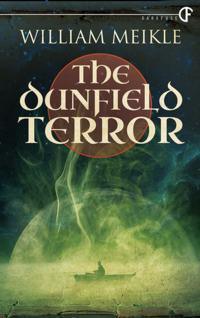
Most of my major influences in one wee package
Q. What influences helped play a part in your writing?
A: It would have to be the reading I did in the genre as a teenager in a small West Coast Scotland town in the early-seventies, before Stephen King and James Herbert came along, that were most formative.
I graduated from Superman and Batman comics to books and I was a voracious reader of anything I could get my hands on.
Tarzan is the second novel I remember reading. (The first was Treasure Island, so I was already well on the way to the land of adventure even then.) I quickly read everything of Burroughs I could find. Then I devoured Wells, Dumas, Verne and Haggard. I moved on to Conan Doyle before I was twelve, and Professor Challenger’s adventures in spiritualism led me, almost directly, to Dennis Wheatley, Algernon Blackwood, and then on to Lovecraft. Then Stephen King came along.
There’s a separate but related thread of a deep love of detective novels running parallel to this, as Conan Doyle also gave me Holmes, then I moved on to Christie, Chandler, Hammett, Ross MacDonald and Ed McBain, reading everything by them I could find.
Mix that with TV watching of Thunderbirds, Doctor Who, the Man From Uncle, Lost in Space and the Time Tunnel, then later exposure on the BBC to the Universal monsters and Hammer vampires and you can see where it all came from. Oh, and Quatermass. Always Quatermass.
Add a hefty slug of heroic fantasy from Howard, Leiber and Moorcock, a sprinkle of fast moving Scottish thrillers from John Buchan and Alistair MacLean, and a final pinch of piratical swashbuckling. Leave to marinate for fifty years and what do you get?
A psyche with a deep love of the weird in its most basic forms, and the urge to beat up monsters.
Read more at: http://www.williammeikle.com/FAQ.html
If anyone has a question, drop me a line in the comments and I’ll answer it in a new entry when I see it.








November 22, 2015
Want to see what’s coming in 2016?
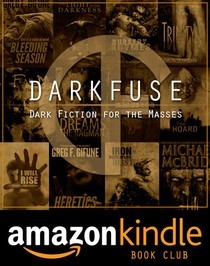 Here’s a sneak peek ahead to 2 novels I’ve got coming from DarkFuse in 2016.
Here’s a sneak peek ahead to 2 novels I’ve got coming from DarkFuse in 2016.
Both of these novels are set in my new home, Newfoundland, and reflect the growing influence this place is having on my writing. It might never supplant Scotland, which is etched into my bones, but it’s getting there.
First up in June we have FUNGOID, an apocalyptic tale of global takeover and plucky survivors. The inspiration for this one is, once again, from some early reading of mine-Wyndham and Hodgson in particular, and also from my own background – I was once nearly a scientist and have a degree in plant biology, back when the world was young and beer was cheap.
It will come in 3 editions, ebook, paperback and limited edition hardcover, which will be one of DarkFuse’s new ‘Signature’ series. Which will be nice.
When the end came, it wasn’t zombies, asteroids, global warming or nuclear winter. It was something that escaped from a lab. Something small, and very hungry.
It starts with deadly rain that delivers death where it falls, but soon the whole planet is under threat as the infection spreads, consuming everything before it.
A band of survivors on the Eastern coast of Canada watch as their world falls and crumbles to ruin. The infection seems relentless. More than that, it seems to be learning, adapting and evolving faster than they can fight it. Worse still—it is infecting not just their bodies, but is creeping into their minds, dancing in their dreams.
Can they stop it before it takes them?
Or must they all join in the final dance of death?
-0O0-
November will see the issue of SONGS OF DREAMING GODS.
This one is a continuation of something I’ve been building to over the past few years. It’s another house, similar to those in BROKEN SIGIL and PENTACLE, but one with its own set of problems.
I’m still building the backstory, but this moves it along another stage. There’s a weird house, singing, some Carlos Castaneda mescaline bullshit, a watcher at the gate, spooky dolls, some booze, some smoking and more singing.
It will come in 3 editions, ebook, paperback and limited edition hardcover.
This is the story of a house.
It sits on a corner block on a hill in one of the oldest cities in North America, a nondescript, three-story wooden cube.
When John Green, Janis Lodge and Todd Wiggins are sent to investigate a multiple murder on the top floor of the property, they start opening doors and uncovering secrets. But like peeling the layers off an onion, each door opened only leads them deeper into the mystery.
There are houses like this all over the world, and those who suffer are drawn to them, as John, Janis and Todd have been drawn.
They have found their way in.
Can they find their way out again? And at what cost?
You can follow the books at the link below (along with many other fine DarkFuse titles, or sign up for the DarkFuse newsletter to be first in line when they become available to order.








November 20, 2015
Friday Freebie – Seven Short Stories
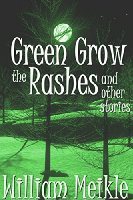
If you’re looking for a taster of my work, this is who I am.
These seven short stories, all previously published in magazines or anthologies, contain magic, monsters, ghosts, history, beer, Scotland, scifi, fantasy, horror, singing, more beer and fun.
This is who I am.








Latest
- William Meikle's profile
- 1845 followers



